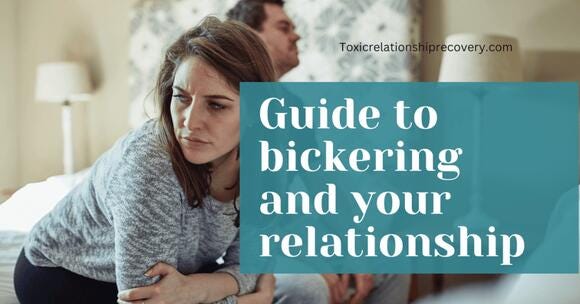Bickering in your relationship
If you are in an intimate relationship and you and your partner are constantly bickering, is this a big deal that highlights bigger issues in the relationship?
If you are in an intimate relationship and you and your partner are constantly bickering, is this a big deal that highlights bigger issues in the relationship? Probably not, as there is constant bickering in almost all healthy long-term relationships.
But why do couples bicker so much?
What are the benefits of these pointless arguments?
Is bickering considered normal, and how can we ensure that the banter does not flare up into a bigger argument and relationship conflict?
Constructive arguing and bickering can be beneficial for couples and can even strengthen their relationships. Research has shown that couples who argue constructively and have the ability to compromise can have healthier relationships than those who do not.
Bickering is not a bad thing, as it can actually help to build trust, create an understanding between couples, and provide them the opportunity to honestly express their feelings and opinions. Couples can also develop a sense of humor and stay connected through bickering.
It is important to remember that bickering is a petty argument that, if handled constructively, can help to keep couples closer. With the right attitude, couples can learn to express their disagreements in a healthy way, leading to a more lasting and fulfilling relationship.

What Is Bickering?
Constructive bickering happens when couples feel comfortable enough to tease, poke fun, and disagree with each other without feeling threatened, and it does not result in big fights. It is important to note that there is a big difference between bickering, name-calling, and insults. Bickering does not include big aggressive arguments.
Couples may bicker over the following small things:
always leaving the toilet seat up after use
leaving clothes lying on the bathroom floor
not wanting to wash the dirty dishes or contribute to household chores
Such behavior can lead to hurt feelings and bigger problems if left unresolved. Bickering and small fights over these small things will give you both the opportunity to constructively resolve these issues.
If you are unsure if your bickering is constructive, allow your partner to be comfortable enough to communicate openly with you, and be willing to listen to each other and compromise. We are all unique and don’t always see things in the same way. Finding a compromise on the little things and focusing on the bigger picture will result in a more harmonious relationship.
This kind of communication is essential for any relationship. If you and your partner can learn how to argue constructively, your relationship can reap the benefits that come with it.
According to the John Gottman Institute, bickering is a very normal thing in relationships.
Benefits Of Bickering
There are many benefits to constructive bickering. Some of them include:
1. Building Trust In Relationships
Arguably, the most important benefit of bickering is the trust it can build between couples.
Arguments can help couples feel more connected to each other and build trust when partners feel safe enough to express their opinions and feelings without judgment.
Studies have shown that people who trust their partners are likely to have longer-lasting relationships and are more likely to stay together. So couples who bicker constructively and develop this trust can have stronger and healthier relationships.
Trust is key in any relationship, especially when it comes to discussing the future together. Bickering can help couples feel more open and comfortable talking about sensitive topics such as money, children, and sex.
Bickering can also help couples understand each other’s personalities, likes, and dislikes and be more empathetic toward each other. Building trust may sound like a lot of work, but it is definitely worth it.
2. Improves Understanding
Another important benefit of bickering is that it can help couples better understand each other’s thoughts, feelings, and needs.
When you get into a disagreement with your partner, you may feel the urge to defend yourself and explain your point of view. It’s during these times, that it is important to remember that your partner also has something to say. Calm communication and listening are important because when someone is being attacked, it can be difficult to listen to what is being said and to be able to respond appropriately.
Gregory Kushnick, a licensed New York City psychologist, says, “Couples will spend a lot of time trying to prove the other person wrong, and there really is no end to that, especially if two people are seeing one situation differently.” He goes on to say, "Essentially, the key is to get the couple to realize that there are two rights to every story.”
When you listen to what your partner has to say, you can see the situation from their point of view. When you both have the chance to express your feelings and opinions, you can begin to better understand each other and find a compromise or agree to disagree.
There are many situations in life where couples will disagree with one another, and it is important to have a way to resolve these issues. Having a better understanding of your partner can help couples better work through their differences and come to an agreement that works for both people.

3. Allows Expression Of Feelings And Opinions
Bickering results in couples expressing their feelings and opinions openly and honestly, which will help to improve their relationship. When you feel that you can discuss your feelings openly, it can help you let go of negative emotions and prevent future issues from arising.
These discussions can often be difficult as couples may feel vulnerable; however, a safe environment will allow more open communication.
These difficult conversations may result in a partner bringing up underlying issues that have been bugging them, and this will allow the couple to deal with them.
However, if you are not in a happy and healthy relationship, it is important to seek professional help.
4. Sense Of Humor
Arguing can help couples build a sense of humor and make light of the situation. When you and your partner can laugh at yourselves and the situation, it can help to relieve some of the tension and stress.
It is important to remember that there is a difference between joking and being sarcastic. When you and your partner make light of a situation, it can help to relieve the tension and show your partner that you are not taking the situation too seriously. But ensure that you provide your partner with the opportunity to feel heard before you start making light of the situation.
However, being overly sarcastic and making jokes at your partner’s expense can be hurtful and inappropriate. Being able to appropriately joke about the situation and have a sense of humor can help couples strengthen their relationship.
5. Staying Connected
Arguing can help couples stay connected and engaged with one another. However, you don’t want to argue all the time, as this can be stressful in any relationship.
Use the bickering as an opportunity to better understand your partner and their needs. By avoiding the blame game, you will be able to ensure that as a couple you stay connected.

How To Argue Constructively
There are a few things to keep in mind when bickering with your partner to make it a healthy experience.
A. Listen To Each Other
One of the most important parts of bickering is to listen to each other. If you and your partner are arguing and you are not listening to what your partner is saying, it can make the situation worse.
When you listen to your partner, you can understand their thoughts and feelings better and can come up with a solution that works for both of you. For example, if dirty washing on the bathroom floor is a big issue for your partner, is dropping the dirty washing into the wash basket such a big deal? Small actions and changes can go a long way to make someone feel heard.
When you and your partner can listen to each other, it can help to strengthen your relationship and resolve issues more effectively.
B. Avoid Personal Attacks
It is important to avoid personal attacks when bickering with your partner. For the best results be conscious of the tone of voice that you use and try to stay calm.
Maintain eye contact so that your partner feels that you are engaged and interested in what they are attempting to communicate to you. If you or your partner suffer from erratic emotional dynamics it’s best to consider this as sensitivity to the conflict may not result in the expected responses.
Arguing is an important part of any relationship, but it can become destructive when couples are unable to let go of an argument and move on. For the best outcome do not allow the argument to roll over into the next day.
Arguing can be a good thing when couples can move on from the argument and be more empathetic toward each other.
C. Respect Each Other
When arguing with your partner, it is important to respect each other. Arguments can be challenging, but it is important to remember to be respectful. When you respect your partner and their opinions, it can help to make the situation more constructive.
When you and your partner can argue without attacking each other, it can help to strengthen your relationship and make the experience more positive.
D. Take Breaks
It is important to remember to take a break when you feel that the argument is getting too intense. Spend some quality time alone and give yourself time to think clearly. A cooling-off period will go a long way in providing you both time to think of the big picture.
This will also avoid emotional responses and power struggles from developing.
Bickering in a long-term relationship is normal. It actually helps to strengthen the relationship and improves communication and honesty.
However, should the bickering escalate and you find that your relationship is rocky due to uncontrolled bickering it may be time to get in contact with a family therapist for couples therapy.
As a Certified Life Coach and Trauma Releasing Practitioner (TRE), I am passionate about writing and helping people navigate toxic and abusive relationships. I spent two decades in an abusive marriage, trying everything I could to fix it. However, I eventually realized that I was not responsible for my partner’s behavior and that I needed to prioritize my own well-being. With determination and strength, I planned, packed, and escaped overnight. Through my experience, insight, and knowledge, I learned valuable lessons that I now use to support others who may be in similar situations. My goal is that, through my story, people will recognize that they are not to blame and that there is hope for a better future. I write based on my own experiences and what I had to learn to transform my life.



